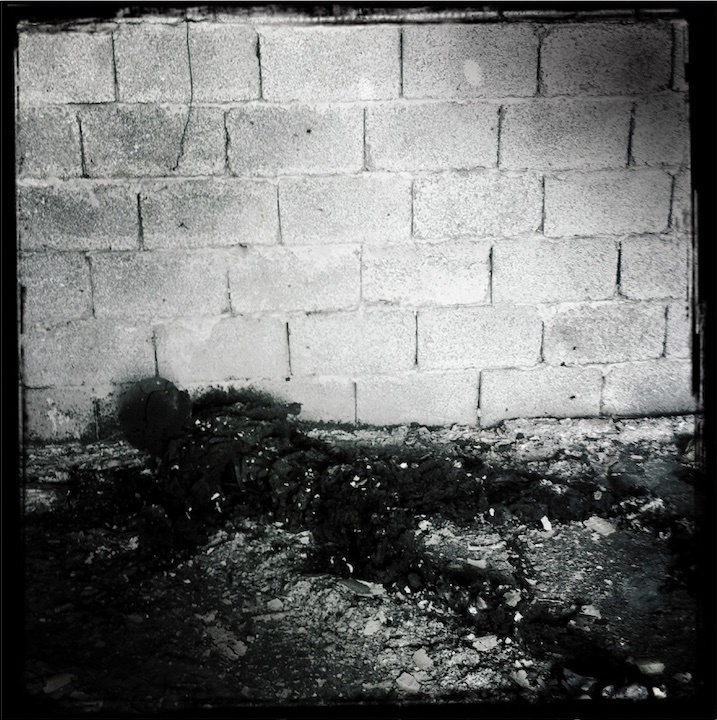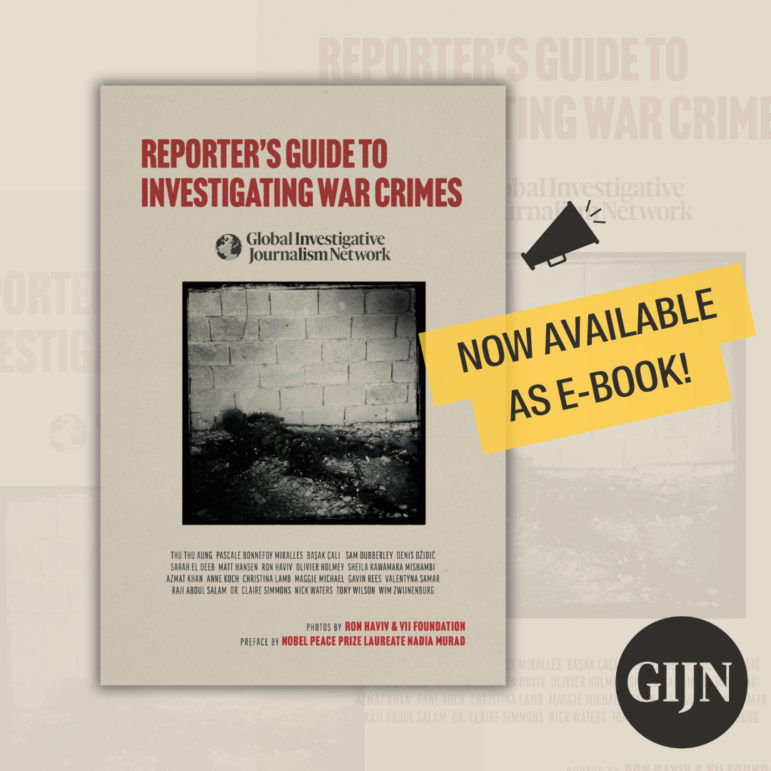
Victims of a massacre by Colonel Muammar Gaddafi’s forces in Tripoli. The men were shot, hand grenades used against them, and then burned in a warehouse near the Khamis Brigade compound. Image: Courtesy of Ron Haviv, VII
Guide
GIJN Reporter’s Guide to Investigating War Crimes
Read this guide in
GIJN’s comprehensive Reporter’s Guide to Investigating War Crimes includes expert advice from more than two dozen specialists and journalists, covering everything from the legal aspects of war, attacks on civilians, conflict-related sexual violence, environmental crimes, banned weapons, genocide, forced disappearances, archiving evidence, open source research, military command structures, tracing war criminals, documenting with photo and video, physical and digital security best practices, and self-care for covering traumatic events.
Chapters
Chapter Guide Resource
Reporter’s Guide to Investigating War Crimes: Preface by Nobel Peace Prize Winner Nadia Murad
Nobel Peace Prize winner Nadia Murad discusses her own personal experience as a Yazidi survivor of conflict-related sexual violence.
Chapter Guide Resource
Investigating War Crimes: Introduction
GIJN Program Director Anne Koch discusses international law relating to conflict and the role of investigative reporting in uncovering war crimes.
Chapter Guide Resource
Investigating War Crimes: What Is Legal in War?
Dr. Claire Simmons offers a detailed overview of the legal rules that do — and do not — apply in war and armed conflict.
Chapter Guide Resource
Investigating War Crimes: Attacks on Civilians
Experts offer practical tips and tools for covering attacks on civilians on the battlefield and interviewing non-combatant survivors of armed conflict.
Chapter Guide Resource
Investigating War Crimes: Conflict-Related Sexual Violence
Investigative reporter Christina Lamb discusses conflict-related sexual violence and the role of the press in investigating these often neglected atrocities.
Chapter Guide Resource
Investigating War Crimes: Environmental and Property Damage
Humanitarian disarmament researcher Wim Zwijnenburg offers best practices for reporting on environmental and property damage during conflicts.
Chapter Guide Resource
Investigating War Crimes: Banned and Restricted Weapons
Former British Army officer and open source analyst Nick Waters discusses banned and restricted weapons and the international laws that regulate them.
Chapter Guide Resource
Investigating War Crimes: Combatants and Others Engaged in Hostilities
Executive director and editor of the Balkan Investigative Reporting Network, Denis Dzidic, discusses best practices for covering combatants and other hostile actors.
Chapter Guide Resource
Investigating War Crimes: Genocide and Crimes Against Humanity
Executive director of the Balkan Investigative Reporting Network, Denis Džidić, discusses best practices for covering genocide and other crimes against humanity.
Chapter Guide Resource
Investigating War Crimes: Collecting and Archiving Evidence and Information
Reuters investigative journalist Maggie Michael offers tips for collecting and archiving evidence of atrocities.
Chapter Guide Resource
Investigating War Crimes: Open Source Research
Open source information can play a role in investigating violations of international humanitarian law and possible war crimes.
Chapter Guide Resource
Investigating War Crimes: Command Structures
Military expert Tony Wilson offers an overview of command structures and their roles in holding leaders accountable for war crimes.
Chapter Guide Resource
Investigating War Crimes: Tracing War Criminals
Burmese journalist Thu Thu Aung discusses methods for tracking down suspected war criminals.
Chapter Guide Resource
Investigating War Crimes: Finding the Missing
Investigative reporter Sarah El Deeb discusses techniques for tracking the missing and those subject to forced disappearances.
Chapter Guide Resource
Investigating War Crimes: Documenting with Photo and Video
World-renowned war photographer Ron Haviv discusses best practices for using photo and video to cover atrocities and possible war crimes.
Chapter Guide Resource
Investigating War Crimes: Interviewing Victims and Survivors
The Dart Center’s Gavin Rees discusses best practices for interviewing victims and survivors of war crimes and armed conflict.
Chapter Guide Resource
Investigating War Crimes: Physical and Digital Security
Security expert Matt Hansen discusses best practices for both physical and digital security for investigative journalists covering possible war crimes.
Chapter Guide Resource
Investigating War Crimes: Self-Care for Covering Traumatic Events
The Dart Center’s Gavin Rees discusses best practices for reporting self-care and processing coverage of traumatic events.
Chapter Guide Resource
Investigating War Crimes: Resources and Tipsheets
GIJN has created a list of useful databases, resources, tipsheets, and research links related to war crimes and atrocities.
Chapter Guide Resource
Investigating War Crimes – Video Recording
This webinar shares methodologies for investigating war and conflict, and provide a briefing on the laws that govern what, in popular usage, are called “war crimes.”
Chapter Guide Resource
GIJN Launches First E-Book — Reporter’s Guide to Investigating War Crimes
To better share our reporting guide on investigating war crimes, GIJN has now published our online guide as the organization’s first-ever e-book.





















